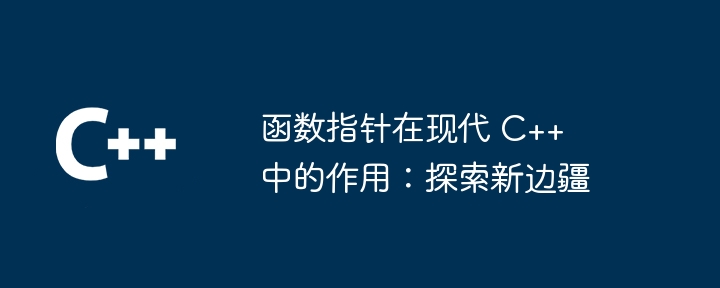
Function pointers allow functions in C to be stored and passed as values, providing flexibility and simplifying the creation of flexible, reusable code. They are used to pass the comparator function of the sorting algorithm and customize the comparison order, thereby improving code readability and maintainability.

The role of function pointers in modern C: Exploring new frontiers
Function pointers are a C feature that allow us Store the function in memory and pass it as a value in our program. This provides great flexibility and allows us to easily create flexible and reusable code.
Declaring a function pointer
The declaration of a function pointer is similar to an ordinary function, but requires an asterisk (*) prefix to indicate that it is a pointer:
typedef int (*FuncPtr)(int);
This declaration indicates that FuncPtr is a pointer to a function that returns int and receives int parameters.
Usage
We can use function pointers to call functions, just like using ordinary functions:
FuncPtr funcPtr = &myFunction; int result = funcPtr(10);
Here, funcPtr points to the myFunction function , calling funcPtr(10) is equivalent to calling myFunction(10).
Practical Case: Sorting Comparator
A common application of function pointers is the comparator used for sorting. Sorting algorithms often require a comparison function to determine whether one element is greater than, equal to, or less than another element. We can use function pointers to pass our comparison functions:
bool compareInts(int a, int b) {
return a < b;
}
void sortArray(int* arr, int size, FuncPtr cmp) {
// 使用传入的比较函数对数组进行排序
}
int main() {
int arr[] = {3, 1, 4, 2};
sortArray(arr, 4, compareInts);
// 输出:1, 2, 3, 4
for (int i = 0; i < 4; i++) {
cout << arr[i] << ", ";
}
cout << endl;
}In this example, the compareInts function is our comparator and the sortArray function accepts a function pointer as a parameter. By passing a custom compareInts function we can sort the array using a specific sort order.
Conclusion
Function pointers provide modern C with great flexibility and code reusability. They allow us to pass functions as values, creating flexible and scalable solutions.
The above is the detailed content of The role of function pointers in modern C++: Exploring new frontiers. For more information, please follow other related articles on the PHP Chinese website!
 The difference between typedef and define
The difference between typedef and define
 Usage of typedef in c language
Usage of typedef in c language
 What are the differences between c++ and c language
What are the differences between c++ and c language
 Recommended learning order for c++ and python
Recommended learning order for c++ and python
 Cost-effectiveness analysis of learning python and c++
Cost-effectiveness analysis of learning python and c++
 Is c language the same as c++?
Is c language the same as c++?
 Which is better to learn first, c language or c++?
Which is better to learn first, c language or c++?
 The difference and connection between c language and c++
The difference and connection between c language and c++




